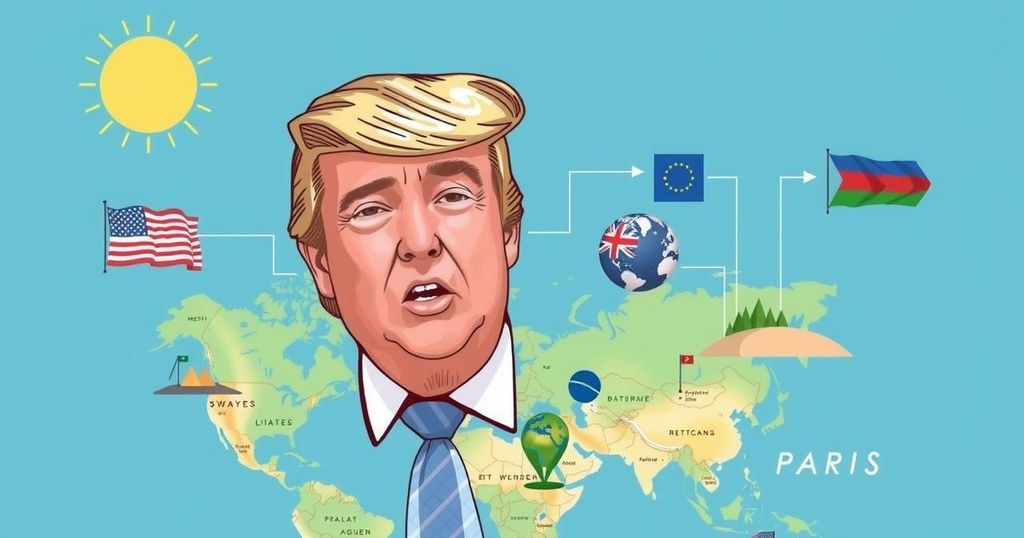Potential Second Withdrawal from Paris Climate Agreement Could Differ Significantly from First

President-elect Donald Trump is considering withdrawing the United States from the Paris Climate Agreement again, which may occur faster than the initial exit. Experts are concerned about the implications for international trust and leadership in climate initiatives. Advocates of withdrawal highlight potential benefits, while opposing views stress the vital role of U.S. participation in the agreement’s success.
President-elect Donald Trump has signaled his intention to withdraw the United States from the Paris Climate Agreement, and it is anticipated that such a withdrawal would differ significantly from the initial exit. Established during the U.N. Climate Change Conference in 2015, this agreement encompasses nearly 195 parties dedicated to global cooperation in addressing climate change. The United States formally joined the treaty in 2016 under the administration of former President Barack Obama. Due to the stipulations set forth in Article 28 of the treaty, Trump was prevented from an immediate withdrawal upon taking office, resulting in the official exit coming only at the end of 2020.
Following Trump’s exit, President Joe Biden reinstated the United States to the Paris Agreement in 2021. As Trump prepares for the possibility of another retreat from the agreement, he has indicated a quicker timeline for such an action. David Waskow from the World Resources Institute noted, “It would be a very different timeline now,” reflecting the potential for expedited withdrawal processes. In light of a possible second exit, experts have commented on the implications for international trust and leadership.
Max Boykoff, an environmental studies professor at CU Boulder, warned that a second U.S. withdrawal could erode trust among global leaders, potentially prompting other nations to reconsider their commitments under the agreement. He cited Argentina’s Libertarian President Javier Milei’s consideration of withdrawal as an example of this ripple effect. Furthermore, Boykoff expressed concern that other nations resistant to climate policies might follow suit.
Despite these concerns, proponents of Trump’s retraction emphasize the perceived benefits, including reclaiming American sovereignty. H. Sterling Burnett from the Heartland Institute remarked, “The benefits of exiting the Paris Climate Agreement are many, first and foremost reclaiming U.S. sovereignty while respecting the rule of law.” He further argued that the agreement imposes unnecessary emission reductions that disadvantage the U.S. in a global context, particularly relative to China.
In preparation for a potential exit, there are discussions regarding the submission of the Paris Agreement to the Senate for advice and consent, which would introduce additional hurdles for future administrations wishing to rejoin. Additionally, some policymakers are evaluating the merits of withdrawing from the U.N. Framework Convention on Climate Change, reflecting a broader strategy to reassess international commitments.
Former EPA Chief of Staff Mandy Gunasekara suggested, “if they’re looking for a more permanent response to getting out of bad deals for the American economy that do little to actually improve the environment.” This sentiment aligns with concerns from other leaders regarding the viability of the Paris Agreement without U.S. participation.
António Guterres, the Secretary-General of the United Nations, remarked on the potential ramifications of a U.S. withdrawal, stating, “The Paris Agreement can survive, but people sometimes can lose important organs or lose the legs and survive. But we don’t want a crippled Paris agreement. We want a real Paris agreement,” underscoring the significance of U.S. involvement to the agreement’s integrity and effectiveness.
The Paris Climate Agreement, crafted in 2015, is a landmark international treaty aiming to combat climate change by limiting global warming and facilitating emissions reductions among participating nations. The United States initially joined the agreement under President Barack Obama, but its status has become uncertain with changes in presidential leadership. The treaty allows for withdrawal, but stipulates a waiting period following ratification. Political shifts in leadership, notably between Trump and Biden, have significantly influenced the U.S.’s stance on climate commitments, drawing attention to the implications of possible future withdrawals and their effects on global climate initiatives.
In summary, President-elect Trump’s potential second withdrawal from the Paris Climate Agreement poses different circumstances than the first due to regulatory changes and a new timeline. The possible exit raises concerns among international leaders about trust and may encourage similar actions from other nations. Advocates for withdrawal cite benefits relating to U.S. sovereignty and economic considerations. However, experts warn that such a move could critically diminish the agreement’s efficacy and international commitment to climate goals.
Original Source: www.foxnews.com







